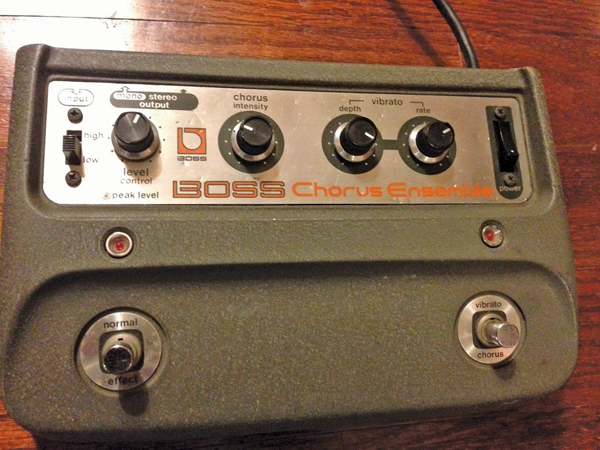The World’s First Commercial Chorus Pedal – Boss CE-1 Chorus Pedal
BACKGROUND
Not only was the CE-1 was the first Boss fx pedal, it was also the first commercial chorus pedal built. It was based on the circuit from their Roland Jazz Chorus amplifier. It is known as the mother of all chorus pedals, and has two features, the first being the chorus and the second true pitch shifting vibrato.
HOW IT WAS USED
This box has been used on countless records. Andy Summers of The Police and Jeff Skunk Baxter of The Doobie Brothers quickly helped to make the CE-1 a classic for guitar players, while Herbie Hancock brought it in vogue for keyboard players. Chorus brings a spatial effect to sounds, making them feel deeper and wider. The vibrato makes the sound feel as though it’s rotating around the listener. Like the famous Brownface Fenders, this vibrato bends the pitch to help enhance the effect.
INTERESTING FEATURES
The Boss is known for its stereo features (mono in/mono or stereo out) and incredibly warm and rich tone. A sound can be given a gentle chorus or vibrato, or deeply affected extreme tones. Another aspect that separates this from many later pedals is how organically the unit affects the sound. It doesn’t sound like something was added on top of the sound, but rather completely integrated like a fine Bechamel sauce. I’ll run whatever my imagination tells me to through it: vocals, bass, guitar, keys, and percussion.
MODERN EQUIVALENT
There are many chorus pedals on the market today, but the warmth of the CE-1 is hard to top. Universal Audio makes a nice plug-in version of the pedal, which is how I first found out about it.
LESSONS LEARNED
This is the chorus that all other choruses are measured up to. There is a reason we all had to read Shakespeare, right?
ABOUT THE AUTHOR
Eric Palmquist is the owner and Principal Engineer of Palmquist Studios (at Infrasonic Sound). Formerly known as Infrasonic Sound, Palmquist acquired the East L.A. recording studio earlier this year, transitioning from studio manager to studio owner. His discography reads as a “Who’s Who” of indie rock, including the critically acclaimed album Leave No Trace from Fool’s Gold, 119 – Trash Talk’s 2012 release via Odd Future Recordings and Life Sux by Wavves. He is always eager to work with new bands as both a producer and engineer. Find more info at www.infrasonicsound.com.

